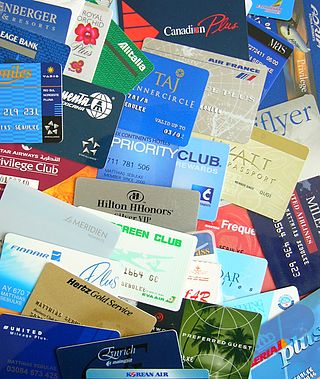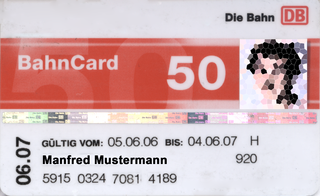Related Research Articles

A debit card, also known as a check card or bank card, is a payment card that can be used in place of cash to make purchases. The card usually consists of the bank's name, a card number, the cardholder's name, and an expiration date, on either the front or the back. Many of the new cards now have a chip on them, which allows people to use their card by touch (contactless), or by inserting the card and keying in a PIN as with swiping the magnetic stripe. These are similar to a credit card, but unlike a credit card, the money for the purchase must be in the cardholder's bank account at the time of the purchase and is immediately transferred directly from that account to the merchant's account to pay for the purchase.

A loyalty program is a marketing strategy designed to encourage customers to continue to shop at or use the services of a business associated with the program. A loyalty program typically involves the operator of a particular program set up an account for a customer of a business associated with the scheme, and then issue to the customer a loyalty card which may be a plastic or paper card, visually similar to a credit card, that identifies the cardholder as a participant in the program. Cards may have a barcode or magstripe to more easily allow for scanning, although some are chip cards or proximity cards.
Discounts and allowances are reductions to a basic price of goods or services.

Dynamic currency conversion (DCC) or cardholder preferred currency (CPC) is a process whereby the amount of a credit card transaction is converted at the point of sale, ATM or internet to the currency of the card's country of issue. DCC is generally provided by third party operators in association with the merchant, and not by a card issuer. Card issuers permit DCC operators to offer DCC in accordance with the card issuers' processing rules. However, using DCC, the customer is usually charged an amount in excess of the transaction amount converted at the normal exchange rate, though this may not be obviously disclosed to the customer at the time. The merchant, the merchant's bank or ATM operator usually impose a markup on the transaction, in addition to the exchange rate that would normally apply, sometimes by as much as 18%.
In marketing, a rebate is a form of buying discount and is an amount paid by way of reduction, return, or refund that is paid retrospectively. It is a type of sales promotion that marketers use primarily as incentives or supplements to product sales. Rebates are also used as a means of enticing price-sensitive consumers into purchasing a product. The mail-in rebate (MIR) is the most common. A MIR entitles the buyer to mail in a coupon, receipt, and barcode in order to receive a check for a particular amount, depending on the particular product, time, and often place of purchase. Rebates are offered by either the retailer or the product manufacturer. Large stores often work in conjunction with manufacturers, usually requiring two or sometimes three separate rebates for each item, and sometimes are valid only at a single store. Rebate forms and special receipts are sometimes printed by the cash register at time of purchase on a separate receipt or available online for download. In some cases, the rebate may be available immediately, in which case it is referred to as an instant rebate. Some rebate programs offer several payout options to consumers, including a paper check, a prepaid card that can be spent immediately without a trip to the bank, or even as a PayPal payout.
A merchant account is a type of bank account that allows businesses to accept payments in multiple ways, typically debit or credit cards. A merchant account is established under an agreement between an acceptor and a merchant acquiring bank for the settlement of payment card transactions. In some cases a payment processor, independent sales organization (ISO), or member service provider (MSP) is also a party to the merchant agreement. Whether a merchant enters into a merchant agreement directly with an acquiring bank or through an aggregator, the agreement contractually binds the merchant to obey the operating regulations established by the card associations. A high-risk merchant account is a business account or merchant account that allows the business to accept online payments though they are considered to be of high-risk nature by the banks and credit card processors. The industries that possess this account are adult industry, travel, Forex trading business, multilevel marketing business. "High-Risk" is the term that is used by the acquiring banks to signify industries or merchants that are involved with the higher financial risk.
Debit card cashback is a service offered to retail customers whereby an amount is added to the total purchase price of a transaction paid by debit card and the customer receives that amount in cash along with the purchase. For example, a customer purchasing $18.99 worth of goods at a supermarket might ask for twenty dollars cashback. The customer would approve a debit payment of $38.99 to the store, and the cashier would then give the customer $20 in cash.
Merchant services is a broad category of financial services intended for use by businesses. In its most specific use, it usually refers to merchant processing services that enables a business to accept a transaction payment through a secure (encrypted) channel using the customer's credit card or debit card or NFC/RFID enabled device. More generally, the term may include:
There is no single 'discount railcard' available on the UK railway network. In addition to the large number and variety of short-term or localised promotional fares that have been available to passengers on the British railway network in recent decades, there are many permanent concessionary fare schemes available to passengers. Some of these take the form of Railcards, which can be purchased by people who qualify according to the conditions, and which give discounts for all journeys over a period; other concessions are available for individual journeys. In all cases, details of the type of concession will be printed on the passenger's travel ticket, to distinguish reduced-rate tickets from those sold at the standard full fare.

Interchange fee is a term used in the payment card industry to describe a fee paid between banks for the acceptance of card-based transactions. Usually for sales/services transactions it is a fee that a merchant's bank pays a customer's bank.

A fuel card or fleet card is used as a payment card most commonly for gasoline, diesel, and other fuels at gas stations. Fleet cards can also be used to pay for vehicle maintenance and expenses at the discretion of the fleet owner or manager. Most fuel cards are charge cards.
The Disabled Persons Railcard is a concessionary fare scheme in the United Kingdom giving eligible passengers with disabilities benefits on the National Rail network including a 1/3 discount on fares.

A transit pass or travel card, often referred to as a bus pass or train pass etc., is a ticket that allows a passenger of the service to take either a certain number of pre-purchased trips or unlimited trips within a fixed period of time.

BahnCard is a discount subscription programme offered by Deutsche Bahn (DB), the German national railway company. Unlike airline loyalty programs, but similarly to the UK Railcard, the BahnCard entitles the passenger to a discount price and must be purchased prior to travel. The BahnCard is offered in a non-business and a business version called BahnCard Business. Non-business BahnCard contracts are automatically renewed each year, unless they are cancelled with sufficient notice. Three variants of BahnCard are sold by Deutsche Bahn: The BahnCard 25, the BahnCard 50, and the BahnCard 100. The first two variants allow passengers to get 25% and 50% discount respectively on standard long-distance rail fares, while the Mobility BahnCard 100 is a type of annual ticket that allows free unlimited travel on most of the German railway network for a fixed price. The (non-business) BahnCard 25/50 are valid for one year and can only be purchased by subscription. If they are not canceled no later than six weeks before the expiry date, their term is automatically extended by another year. BahnCard Business 25/50 are also valid for one year but require no cancellation. Unlike the personal BahnCard, BahnCard Business can be combined with the discount that is granted to large-volume business customers.

A credit card is a payment card, usually issued by a bank, allowing its users to purchase goods or services or withdraw cash on credit. Using the card thus accrues debt that has to be repaid later. Credit cards are one of the most widely used forms of payment across the world.

Rede known as Redecard is a Brazilian multi-brand acquirer with 25 brands in its portfolio, for credit, debit and benefit cards. Its activities include merchant acquiring, capturing, transmission, processing and settlement of credit and debit card transactions, prepayment of receivables to merchants, rental of POS terminals, check verification through POS terminals, credit card machine and the capture and transmission of transactions using benefit-voucher, private-label cards and loyalty programs such as Multiplus. The company is the first largest in its sector. The company was traded in BM&F Bovespa and disclosed in 2012, 24, September.
GO Transit is the inter-regional transportation authority of the Golden Horseshoe, which includes the Greater Toronto and Hamilton Area. It is Canada's oldest regional transit system, first serving passengers in 1967.

A surcharge, also known as checkout fee, is an extra fee charged by a merchant when receiving a payment by cheque, credit card, charge card or debit card which at least covers the cost to the merchant of accepting that means of payment, such as the merchant service fee imposed by a credit card company. Retailers generally incur higher costs when consumers choose to pay by credit card due to higher merchant service fees compared to traditional payment methods such as cash.
The Scottish National Entitlement Card (NEC) is a Scotland-wide smart card scheme run by Scottish Local Authorities on behalf of the Scottish Government. It is predominantly operated as a concessionary travel pass, but can also act as Proof of Age for young people (Young Scot NEC) and give access to civic services such as libraries and leisure centres depending on the local authority.
A reduced fare program refers to special programs providing particular passengers with a discounted fare option for travel on a public transport system. In the United States, public transportation systems that receive federal funding are required to offer, at minimum, half fares to the elderly and handicapped persons during off peak travel. Some transportation systems also extend reduced fare options to youth, students, military personnel, and low-income passengers.
References
- ↑ Card for former members of US military services "to honor and thank all who serve our country", available on annual payment
- ↑ UK card offering "Concessions and Recognition for ex-forces" Archived May 1, 2012, at the Wayback Machine , available on payment
- ↑ Card offering discount in for parking in state parks to disabled people in California, USA, for small administrative charge